
- Subject:
- Social Science
- Material Type:
- Module
- Date Added:
- 07/10/2017


This course examines the birth and international expansion of an American industry of political marketing. It focuses attention on the cultural processes, sociopolitical contexts and moral utopias that shape the practice of political marketing in the U.S. and in different countries. By looking at the debates and expert practices at the core of the business of politics, the course explores how the "universal" concept of democracy is interpreted and reworked through space and time, while examining how different cultural groups experimenting with political marketing understand the role of citizens in a democracy.

Interdisciplinary survey of people of African descent that draws on the overlapping approaches of history, literature, anthropology, legal studies, media studies, performance, linguistics, and creative writing. This course connects the experiences of African-Americans and of other American minorities, focusing on social, political, and cultural histories, and on linguistic patterns.
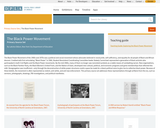
This collection uses primary sources to explore the Black Power Movement. Digital Public Library of America Primary Source Sets are designed to help students develop their critical thinking skills and draw diverse material from libraries, archives, and museums across the United States. Each set includes an overview, ten to fifteen primary sources, links to related resources, and a teaching guide. These sets were created and reviewed by the teachers on the DPLA's Education Advisory Committee.
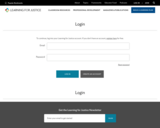
This lesson is part of a series called “Changing Demographics, Changing Identity, Changing Attitudes” The series focuses on how the American identity has and will continue to change as we move toward a plurality nation, how the nation responds to that evolving identity, how changing demographics relate to issues of equality, and what we can do to promote respect for all people living in the United States.
In this lesson, students consider actions we can take to promote respect and ensure equality for all people living in the United States.
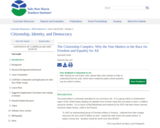
Not all people are born equal or free but there is an expectation of both when you are a citizen of the United States. Our struggles to earn the base level of representation are quickly forgotten as we look for another group to demonize. In my unit we will discover why George Washington was ahead of his time with his warning about "factions" and how their existence makes freedom and equality harder to bridge. As we trek through time highlighting issues such as the abolition of slavery, support for women's suffrage, and the challenges that face Asian and LGBTQIA communities my hope is that student understand the sacrifices made to be accepted and to earn the right to vote but more importantly the difficulty in being welcomed into American society.
The “Citizenship Complex” is the process by which groups gain full inclusion. To understand it, one must look to the intersection of law, citizenship and the Constitution. The unit aims to provide a more complex history of our nation, to tell a more earnest story of how the American identity became a mosaic of human struggle, and to offer a more robust and enlightening study of these issues so that as students recognize the power of citizenship they will take a more hopeful view of what our nation will look like in the future. By engaging in the sophisticated discussions of the past, identifying why some groups supported each other and scapegoated others, and learning about the importance of supporting efforts at inclusion, our students should become more informed, open-minded, and ready for the globalized world of the 21 st Century.
The unit will focus on four groups that have experienced the “Citizenship Complex”: African-American slaves, women, Asian immigrants, and the LGBTQIA community. By comparing these groups over time, we will really be able to unearth the cycles behind the Citizenship Complex and understand that American citizenship means at different times in our country’s history.
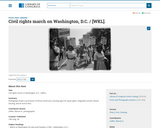
Photograph shows a procession of African Americans carrying signs for equal rights, integrated schools, decent housing, and an end to bias. Students will list their observations, make inferences, and devise questions while working in small cooperative learning groups using the LOC Primary Source Analysis Tool. Special attention should be drawn to the vocabulary (integrated, bias, and equal rights) words on the signs. Were African Americans truly free? What bound them? How does "separate but equal" play here? Does equal mean the same thing for everyone? How did perspectives impact society at this time?
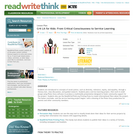
Students take their ideas from the classroom page to the community pavement when they participate in a service-learning project based on their multimedia presentations.

This lesson is designed for middle school students (6th-8th grade) to understand the difference between discrimination and prejudice. In this lesson, students will learn the definitions of the two concepts with associated examples as well. Lastly, the lesson has a slide on the actions people need to take to eliminate these concepts from our society.

This lesson is designed for middle school students (6th-8th grade) to understand the difference between discrimination and prejudice. In this lesson, students will learn the definitions of the two concepts with associated examples as well. Lastly, the lesson has a slide on the actions people need to take to eliminate these concepts from our society.
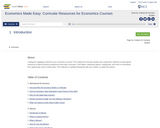
Looking for engaging content for your economics courses? The Institute for Humane Studies has curated this collection of educational resources to help economics professors enrich their curriculum. Find videos, interactive games, reading lists, and more on everything from opportunity costs to trade policy. This collection is updated frequently with new content, so watch this space!
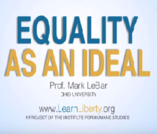
Philosophers across many different ideologies argue that equality is an important human ideal. But what type of equality should we strive for? In this lecture, Professor Mark LeBar of Florida State University reviews four different kinds of equality and the obstacles in achieving them.

As we read broadly from throughout the vast chronological period that is "Homer to Dante," we will pepper our readings of individual ancient and medieval texts with broader questions like: what images, themes, and philosophical questions recur through the period; are there distinctly "classical" or "medieval" ways of depicting or addressing them; and what do terms like "Antiquity" or "the Middle Ages" even mean? (What are the Middle Ages in the "middle" of, for example?) Our texts will include adventure tales of travel and self-discovery (Homer's Odyssey and Dante's Inferno); courtroom dramas of vengeance and reconciliation (Aeschylus's Oresteia and the Icelandic Njáls saga); short poems of love and transformation (Ovid's Metamorphoses and the Lais of Marie de France); and epics of war, nation-construction, and empire (Homer's Iliad, Virgil's Aeneid, and the Anglo-Saxon Beowulf).
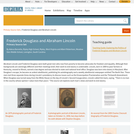
This collection uses primary sources to compare and explore the relationships between Frederick Douglass and Abraham Lincoln. Digital Public Library of America Primary Source Sets are designed to help students develop their critical thinking skills and draw diverse material from libraries, archives, and museums across the United States. Each set includes an overview, ten to fifteen primary sources, links to related resources, and a teaching guide. These sets were created and reviewed by the teachers on the DPLA's Education Advisory Committee.
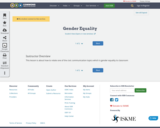
This lesson is about how to relate one of the civic communication topics which is gender equality to classroom

Does it matter in education whether or not you've got a Y chromosome? You bet it does. In this discussion-based seminar, we will explore why males vastly outrank females in math and science and career advancements (particularly in academia), and why girls get better grades and go to college more often than boys. Do the sexes have different learning styles? Are women denied advanced opportunities in academia and the workforce? How do family life and family decisions affect careers for both men and women?
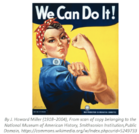
The first wave of the Women’s Liberation Movement (also known as “feminism”) occurred during the mid to late-1800s. The main objective was votes for women. In the mid-1960’s, the second wave of feminism appeared with a goal for women to obtain a stronger role in American society. This lesson will examine the second wave of the Women’s Liberation Movement by exploring the changes in the traditional role of women and discovering the role that The Feminine Mystique played in those societal changes. You will discover how the Women’s Movement is still pushing for equality today.StandardsCC.8.5.9-10.D Determine the meaning of words and phrases as they are used in a text, including vocabulary describing political, social, or economic aspects of history/social science.CC.8.6.9-10.G Gather relevant information from multiple authoritative print and digital sources, using advanced searches effectively; assess the usefulness of each source in answering the research question; integrate information into the text selectively to maintain the flow of ideas, avoiding plagiarism and following a standard format for citation.

The first wave of the Women’s Liberation Movement (also known as “feminism”) occurred during the mid to late-1800s. The main objective was votes for women. In the mid-1960’s, the second wave of feminism appeared with a goal for women to obtain a stronger role in American society. This lesson will examine the second wave of the Women’s Liberation Movement by exploring the changes in the traditional role of women and discovering the role that The Feminine Mystique played in those societal changes. You will discover how the Women’s Movement is still pushing for equality today.StandardsCC.8.5.9-10.D Determine the meaning of words and phrases as they are used in a text, including vocabulary describing political, social, or economic aspects of history/social science.CC.8.6.9-10.G Gather relevant information from multiple authoritative print and digital sources, using advanced searches effectively; assess the usefulness of each source in answering the research question; integrate information into the text selectively to maintain the flow of ideas, avoiding plagiarism and following a standard format for citation.

The first wave of the Women’s Liberation Movement (also known as “feminism”) occurred during the mid to late-1800s. The main objective was votes for women. In the mid-1960’s, the second wave of feminism appeared with a goal for women to obtain a stronger role in American society. This lesson will examine the second wave of the Women’s Liberation Movement by exploring the changes in the traditional role of women and discovering the role that The Feminine Mystique played in those societal changes. You will discover how the Women’s Movement is still pushing for equality today.StandardsCC.8.5.9-10.D Determine the meaning of words and phrases as they are used in a text, including vocabulary describing political, social, or economic aspects of history/social science.CC.8.6.9-10.G Gather relevant information from multiple authoritative print and digital sources, using advanced searches effectively; assess the usefulness of each source in answering the research question; integrate information into the text selectively to maintain the flow of ideas, avoiding plagiarism and following a standard format for citation.

This course explores the ideal of social justice. What makes a society just? We will approach this question by studying three opposing theories of justice—utilitarianism, libertarianism, and egalitarian liberalism—each foundational to contemporary political thought and discourse.